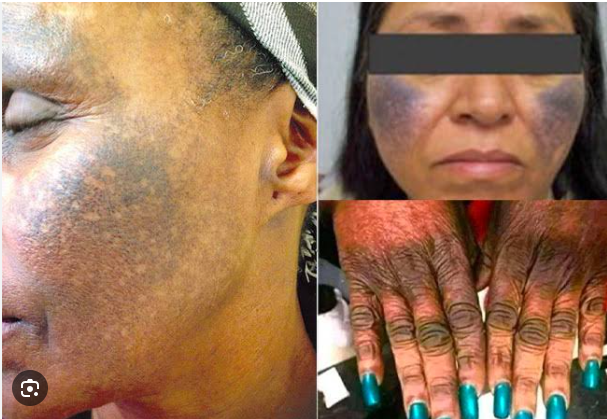In the modern world, societal ideals of beauty can occasionally put a lot of pressure on people, driving them to look for different ways to change their looks. Skin bleaching is one such technique that has gained acceptance but remains controversial. Using chemicals to lessen the skin’s natural color is known as skin bleaching, also known as skin lightening or whitening. While trying to have a lighter complexion could sound alluring, it’s important to be aware of the drawbacks that this method has.
We shall discuss the negative effects of skin bleaching in this blog article and promote accepting one’s inherent beauty.
Damage to the skin
Typically, harsh chemicals like hydroquinone, mercury, and steroids are found in skin bleaching creams. Long-term exposure to these compounds can harm the skin’s structure and interfere with its normal processes. For instance, hydroquinone can thin the skin, make people more sensitive to the sun, and even produce ochronosis, a disorder that results in bluish-black pigmentation.
Uneven skin tone and texture
Skin whitening frequently results in an unbalanced skin tone and texture. The formation of melanin, the pigment responsible for skin color, can be interfered with by the chemicals found in these items. People may as a result have skin that is blotchy and spotty and loses its natural brightness and smoothness.
Increased risk of skin cancer
The risk of skin cancer might be considerably increased by using skin bleaching products excessively. Natural defense against the sun’s damaging UV rays is provided by melanin. Skin bleaching decreases the formation of melanin, which increases the risk of skin cancer, premature aging, and sunburns in the skin.
Negative Psychological effect
Many times, deep-seated social pressures and a desire to conform to a specific definition of beauty are the driving forces behind the pursuit of lighter skin. However, skin bleaching might have negative psychological repercussions. Low self-esteem, body dysmorphia, and inadequate feelings can all emerge in people. Additionally, using skin bleaching solutions on a regular basis might cause dependency and an unhealthy obsession with having lighter skin.
Social and cultural implication
Skin bleaching supports negative aesthetic standards that maintain colorism and prejudice against people with different skin tones. This practice causes societal and cultural differences by conveying the idea that skin that is lighter is superior and more desired. We may encourage inclusivity and encourage self-acceptance by embracing and celebrating the variety of skin tones that we have.
Although skin bleaching may promise brief changes in look, the risks it entails outweigh any prospective advantages. It is important to understand that beauty comes in a variety of hues and expressions. A significant manifestation of self-acceptance and self-love is embracing our natural skin tone. Let’s defy social conventions and honor the distinctiveness of our melanin-rich skin. We can build a world where beauty knows no bounds by encouraging inclusiveness, variety, and self-acceptance.
Keep in mind that you are beautiful just the way you are. Accept your inherent attractiveness and let your inner brilliance to shine.
Note that the goals of this blog post are to spread knowledge and encourage self-acceptance. It is advised to get support from competent professionals if you are experiencing psychological discomfort or body image problems.

